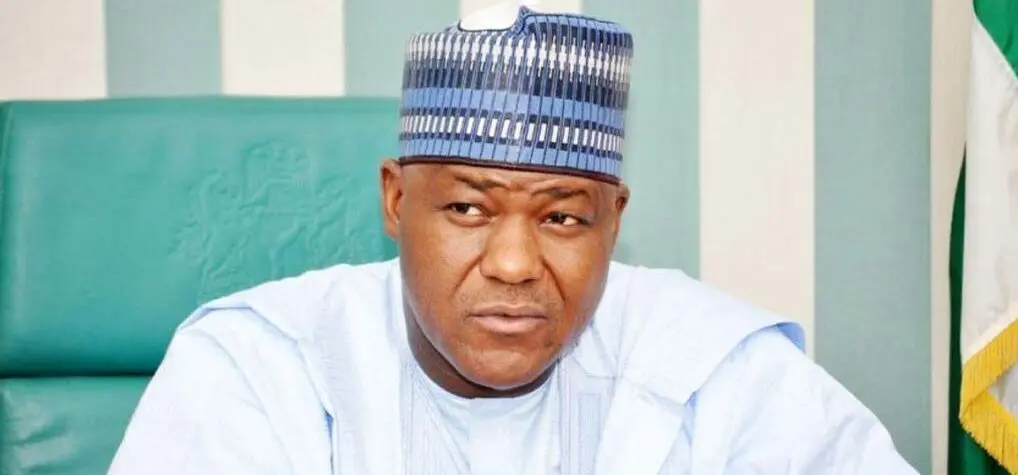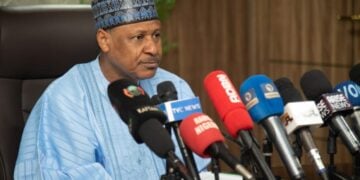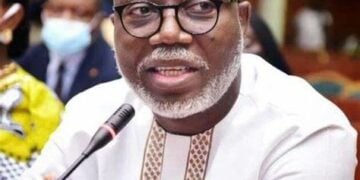A former Speaker of the House of Representatives, Rt. Hon. Yakubu Dogara, has described President Bola Tinubu’s sweeping tax reforms as the most audacious overhaul of Nigeria’s fiscal framework in decades.
He urged the government to ensure transparency and sustained implementation to secure public trust.
Dogara, who delivered the maiden Distinguished Parliamentarian Lecture organised yesterday by the House of Representatives Press Corps at the National Assembly Complex, Abuja, said Tinubu inherited an economy riddled with “economic debris,” such as excessive deficit financing through Ways and Means, dual exchange rates that enriched a few at the expense of many, and crude oil forward sales tied to foreign loans.
The lecture was titled “Navigating Tax Reform in Nigeria: Insights on President Tinubu’s Policies.” The former speaker examined the origin, scope and the expected impact of the tax reforms encapsulated in the Nigeria Tax Act (NTA) 2025 and related legislation.
Dogara said, “By the time President Tinubu took office, N22.7 trillion had been printed and injected into the economy, destroying the value of the naira. Some anointed people were making hundreds of millions off forex allocations without producing any goods or services whatsoever.”
He argued that these structural distortions made urgent reforms inevitable.
“From day one, it was clear that something urgent, nay revolutionary, must be done to prevent our economy from imploding,” he said, stressing that the president had acted with courage despite fierce opposition.
Dogara outlined the key provisions of the reforms, which consolidate 16 federal tax statutes into four principal Acts: Nigeria Tax Act (NTA) 2025: Consolidates multiple tax laws into a unified framework, expands the tax base to cover digital services and virtual currencies, and introduces a 15% minimum effective tax rate for large companies.
According to him, the reforms, which will be fully operational by January 2026, are designed to simplify Nigeria’s complex tax regime, broaden the tax net, encourage compliance, and align domestic rules with global standards.
Quoting the report of the Presidential Committee on Fiscal Policy and Tax Reform, chaired by Prof. Taiwo Oyedele, Dogara said the reforms were conceived to “protect the poor, empower businesses, encourage investment, and ensure fairness across society.”
Among the reliefs introduced are exemptions for small companies with a turnover of N100 million or less, rent reliefs for salaried workers, tax credits for upstream oil operators, and a full income tax exemption for individuals earning N800,000 or less annually.
The reforms also abolish multiple sectoral levies, replacing them with a single 4% development levy, while new provisions bring digital gains, crypto assets, and foreign exchange earnings into the tax net.
Dogara addressed concerns over a 5% fuel surcharge captured in the new Act, saying it was not a new tax but a restatement of an existing provision in the Federal Roads Maintenance Agency (FERMA) Act, 2007.
Despite applauding the boldness of the reforms, Dogara highlighted challenges around uncertainty in interpretation, technological readiness, skilled manpower and short-term compliance costs.
“True tax reform is not about raising rates, but about raising trust. When citizens can see where their naira goes, they are proud to give it,” he said.
Dogara urged the government to ensure revenues raised are transparently deployed to build roads, power industries, and improve hospitals and schools.
“Let this reform be a pact between the government and the private sector, a promise that if we contribute diligently, the government will deploy those resources responsibly,” he said.
He called on President Tinubu to ensure sustained implementation, as the reforms could cement his place in history.
The incumbent Speaker of the House of Representatives, Rt. Hon. Tajudeen Abbas, commended Tinubu’s bold tax reforms, describing them as a decisive step toward simplifying compliance, broadening the tax net, and easing the burden on ordinary Nigerians.
Abbas was represented by the House spokesperson and chairman, Committee on Media and Public Affairs, Hon. Akin Rotimi Jnr.
He said the establishment of the Presidential Committee on Fiscal Policy and Tax Reforms, chaired by Mr. Taiwo Oyedele, and the harmonisation of tax collection processes set to take effect in January 2026, represent “a significant intervention that promises to re-engineer our tax administration architecture for greater efficiency, fairness, and transparency.”
Special Assistant on Tax Policy to the Executive Chairman, FIRS, and Head of the Fiscal and Tax Reforms Implementation Division Mr. Olufemi Olarinde, who represented the executive chairman Dr. Zacch Adedeji reaffirmed its commitment to press freedom and called for stronger collaboration between the media and tax authorities in deepening public understanding of ongoing fiscal reforms.
He acknowledged the historic role of the press as the “fourth estate of the realm,” stressing that its influence on public opinion makes it indispensable to the success of Nigeria’s economic and tax reforms,” he said
He urged journalists to go beyond surface reporting by fully acquainting themselves with the new tax laws, insisting that effective communication of reforms can only come from deep understanding.
He assured that under Dr. Adedeji’s leadership, the FIRS will remain open and accessible to the media as partners in national development.
The Civil Society Legislative Advocacy Centre (CISLAC) endorsed the ongoing tax reforms in Nigeria, urging the government to ensure transparency, accountability, and fairness in their implementation.
Its executive director, Auwal Ibrahim Musa Rafsanjani said the reforms, if properly implemented, would strengthen Nigeria’s fiscal position and ensure that taxes serve the interests of citizens rather than being diverted through loopholes and weak enforcement.
“Nigeria is losing a lot of revenue due to tax avoidance, evasion, and the failure of international corporations operating in our country to meet their obligations. In addition, we have seen a situation where multiple government agencies want to play the role of tax collectors, creating exploitation and dual taxation. A unified, transparent system is urgently needed,” he said.





